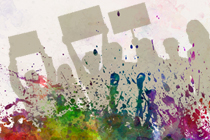COLLEGE PARK, Md. – A $225,000 grant from the National Endowment for the Humanities awarded to the College of Arts and Humanities at University of Maryland (UMD) and the Maryland Humanities Council will fund a series of public programs that are designed to explore the way citizens of Baltimore are thinking about the narratives that influence the life and identity of the city. Major partners will include the University of Maryland, Baltimore County’s Dresher Center for the Humanities, the Enoch Pratt Free Library and the Greater Baltimore Cultural Alliance.
The initiative, Baltimore Stories: Narratives and the Life of an American City (Baltimore Stories), seeks to establish a model that utilizes humanities scholarship— literature, history, philosophy, communication, art and cultural studies—to produce print and digital materials that help frame and contextualize narratives of race in American cities. The project will also shine a spotlight on the ongoing, collaborative work being done in Baltimore neighborhoods by universities and non-profit organizations.
“During the uprising, Baltimore residents had lively conversations about the stories that shape our perceptions of each other,” said Sheri Parks, co-project director of the initiative and associate dean for research and interdisciplinary programming in the College of Arts and Humanities at the University of Maryland. “We are elated to use this grant as a platform to continue these conversations.”
The NEH announced yesterday $21.8 million in grants, including $3.6 million devoted to new “Humanities in the Public Square” grants that support community discussions on the relevance of the humanities to civic life.
“We are honored to answer the call that NEH Chairman Adams issued earlier this year to use the humanities to ‘take up the grand challenges of our time,’” said Phoebe Stein, co-project director of the initiative and executive director of the Maryland Humanities Council. “The equity that needs to be created here in Baltimore, and across much of the nation, can begin with the humanities as they give us contexts for understanding and addressing this inequity and the narratives that undergird it. The humanities facilitate the conversations that can ultimately contribute to solutions.”
The idea for Baltimore Stories was born from UMD’s third annual Baltimore ThinkAThon, which was held April 30, 2015 in the midst of the Baltimore protests. Over 100 participants from the state’s major cultural institutions gathered to demonstrate the efficacy of humanities-based ideas and methods in the real world. Many proposed projects centered on the way stories shaped the understanding of the protests, and narrative emerged as a central concern.
“Narrative or the collectives of stories we tell ourselves and each other is also a major focus of the humanities, so we hope to help citizens investigate and contextualize the past, present and future to uncover truths and move communities toward reconciliation,” said Parks.
ABOUT THE UNIVERSITY OF MARYLAND
The University of Maryland is the state's flagship university and one of the nation's preeminent public research universities. A global leader in research, entrepreneurship and innovation, the university is home to more than 37,000 students, 9,000 faculty and staff, and 250 academic programs. Its faculty includes three Nobel laureates, two Pulitzer Prize winners, 49 members of the national academies and scores of Fulbright scholars. The institution has a $1.8 billion operating budget, secures $500 million annually in external research funding and recently completed a $1 billion fundraising campaign. For more information, visit www.umd.edu.
ABOUT THE MARYLAND HUMANITIES COUNCIL
The Maryland Humanities Council is a statewide, educational nonprofit organization that creates and supports educational experiences in the humanities that inspire all Marylanders to embrace lifelong learning, exchange ideas openly, and enrich their communities. For more information, visit www.mdhc.org. The Maryland Humanities Council is supported in part by the National Endowment for the Humanities, the State of Maryland, and the William G. Baker, Jr. Memorial Fund, creator of the Baker Artist Awards.
ABOUT THE NATIONAL ENDOWMENT FOR THE HUMANITIES
Created in 1965 as an independent federal agency, the National Endowment for the Humanities supports research and learning in history, literature, philosophy, and other areas of the humanities by funding selected, peer-reviewed proposals from around the nation. Additional information about the National Endowment for the Humanities and its grant programs is available at: www.neh.gov.









